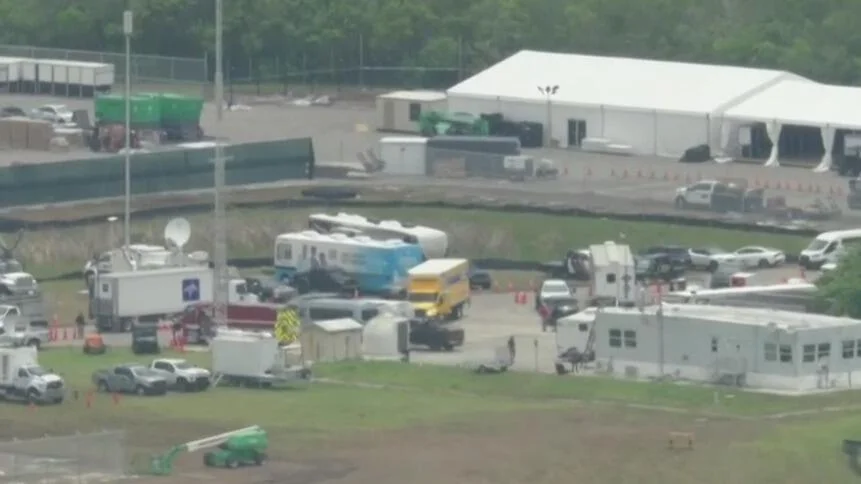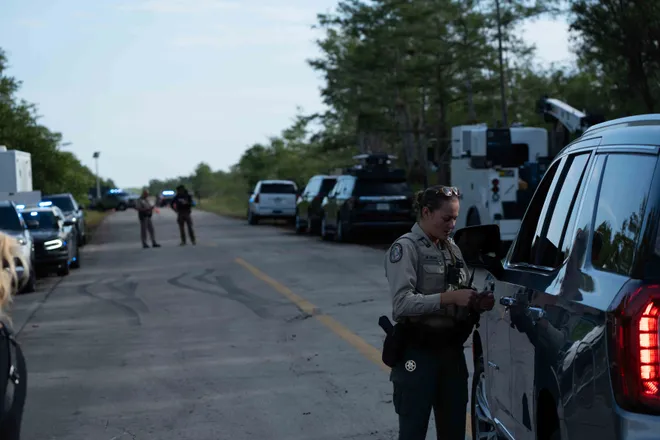Florida Builds a Migrant Detention Center in Sacred Lands
Deep within the Florida Everglades, a controversial migrant detention facility, dubbed "Alligator Alcatraz," is taking shape at a staggering projected cost of $450 million a year. This facility is not just a temporary measure; it symbolizes a growing trend of militarized immigration enforcement. Florida Governor Ron DeSantis, in a recent news conference, stated, "We had a request from the federal government to do it, and so "Alligator Alcatraz" it is," framing the facility as a necessary response to what he describes as a surge in undocumented immigrants. However, the implications of this project extend far beyond immigration policy—they threaten the sanctity of Indigenous lands and the delicate ecosystem of the Everglades.
Environmental Justice at Stake
The site of this facility, the Dade-Collier Training and Transition Airport, is located in an ecologically sensitive area that serves as a vital source of freshwater for millions of Floridians. As reported by The New York Times, environmental advocacy groups, including Friends of the Everglades, have already filed lawsuits to halt the construction, arguing that it circumvents standard environmental reviews. The fear is not just about the immediate impact of constructing a detention center; it’s about the long-term degradation of a crucial ecosystem that supports both wildlife and human populations.

President Trump to visit "Alligator Alcatraz" immigrant detention center amid ongoing protests
Indigenous Voices Raise Alarm
The Miccosukee Tribe has vocally opposed the facility, asserting that it desecrates sacred land. Tribal member Betty Osceola, an environmental activist, expressed her outrage, stating, "This is our ancestral territory. I come out here to pray. This is our home. We are standing up for our home." Osceola"s sentiments resonate with Indigenous communities across the country who often find themselves on the frontlines of environmental degradation, exacerbated by governmental policies that prioritize profit over preservation.
Dehumanizing Conditions Await Migrants
Described as "self-contained," the facility will house up to 3,000 migrants in FEMA trailers and soft-sided temporary structures, as confirmed by a Department of Homeland Security official to CNN. Critics have drawn comparisons to the infamous tent cities of Sheriff Joe Arpaio in Arizona, labeling the conditions as inhumane. Thomas Kennedy from the Florida Immigrant Coalition remarked that the facility is "engineered to enact suffering," emphasizing the cruelty of detaining individuals in tents during Florida"s oppressive summer heat and hurricane season.

Alligator Alcatraz pictures: Trump visits Florida detention center
Political Motives Behind the Facility
While the DeSantis administration touts the facility as a necessary measure to relieve pressure on local law enforcement and jails, the political motivations are glaringly evident. The facility represents a broader trend in the Trump administration"s immigration policies, which seek to normalize the criminalization of migrants. White House Press Secretary Karoline Leavitt"s remarks about alligators serving as a deterrent for escape reveal an alarming dehumanization of individuals seeking refuge. Language that likens migrants to vermin is not just offensive; it reflects a systemic failure to recognize their humanity.
With over 58,000 immigrants currently in ICE custody, the construction of "Alligator Alcatraz" is a blatant escalation of state violence against marginalized communities. This project is emblematic of a political climate that prioritizes punitive measures over compassion and justice, perpetuating cycles of suffering for those fleeing violence and poverty.

![[Video] Federal officers deploy sting balls and flash grenades at Whipple Building](/_next/image?url=%2Fapi%2Fimage%2Fthumbnails%2Fthumbnail-1768340555229-vhfcc-thumbnail.jpg&w=3840&q=75)
![[Video] Crowd-control weapons used in Minneapolis as anti-ICE protesters attack police vehicle](/_next/image?url=%2Fapi%2Fimage%2Fthumbnails%2Fthumbnail-1768336302231-akxf7s-thumbnail.jpg&w=3840&q=75)

![[Video] Protests erupt in Minneapolis after ICE detains teenager, multiple arrests made](/_next/image?url=%2Fapi%2Fimage%2Fthumbnails%2Fthumbnail-1768331835371-z9ylqg-thumbnail.jpg&w=3840&q=75)


![[Video] Gunfire between Iraqi security forces and Sadr militias in Baghdad](/_next/image?url=%2Fapi%2Fimage%2Fthumbnails%2Fthumbnail-1768343508874-4redb-thumbnail.jpg&w=3840&q=75)
